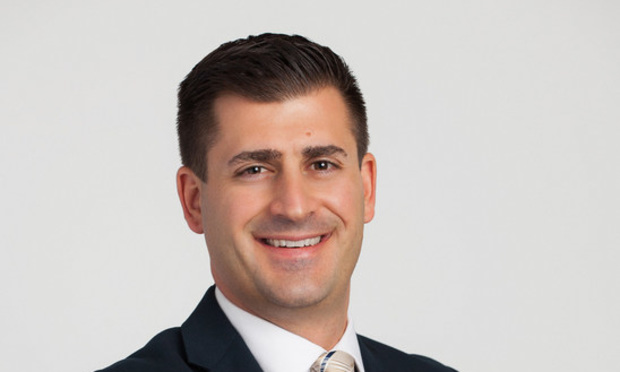Ex-Prosecutors Proliferate New Jersey Lateral Market
Any challenges with the transition, including learning to generate business, are outweighed by law firms' desire to hire practitioners with the sort of experience they possess.
March 08, 2019 at 03:51 PM
7 minute read
 Matthew Troiano [Photo Credit: Enduring Images Photography - Mat Robinson.]
Matthew Troiano [Photo Credit: Enduring Images Photography - Mat Robinson.]
The decision to change sides, so to speak, and the transition itself, can both be difficult, the lawyers say. But any challenges with the transition, including learning to generate business, are outweighed by law firms' desire to hire practitioners with the sort of experience they possess.
The concept of billing hours and rainmaking “is foreign to us—it's a totally different line of work,” said Matthew Troiano, who last November joined Einhorn, Harris, Ascher, Barbarito & Frost in Denville as counsel to chair the firm's four-member criminal practice group. A prosecutor since 2006, and practicing at the Morris County Prosecutor's Office since 2011, Troiano left that office as chief assistant prosecutor.
In private practice, “You look at your calendar. Frequently … there are vacancies there. You say to yourself, are the clients going to come in?” he said. But he added that his practice so far has been busier than expected, with referrals coming in from the firm's family law group, mainly domestic violence matters.
It's not merely his own practice that Troiano is concerned with, he said, as he looks to take over and run the practice for name partner Michael Ascher, who is heading toward retirement.
“My charge is to grow this practice,” which handles Superior Court and municipal court matters, along with investigations, Troiano said. “It falls on me.”
Law firms in New Jersey have shown that growing the practice can be done.
Lowenstein Sandler has recruited heavily to its white-collar criminal defense practice of late, and each lateral addition is a former prosecutor.
“Clearly, when you come out of government, you need a runway,” managing partner Gary Wingens said in an interview. “But we've had a white-collar practice in this firm for over 30 years.”
In 2018 alone, the firm hired onetime federal prosecutors Paul Matey and Ryan Wilson; Peter Slocum, a former first assistant attorney general in New Jersey; Elie Honig, the former New Jersey Division of Criminal Justice director and onetime federal prosecutor in New York; and Kathleen A. McGee, a former head of the Bureau of Internet and Technology in the New York Attorney General's Office.
That's not to mention former New Jersey attorneys general Chris Porrino and Anne Milgram, who joined Lowenstein in January 2018 and July 2017, respectively. Milgram, in particular, had been a prosecutor by trade. Even before serving as attorney general from 2007 to 2010, she was first assistant attorney general in New Jersey, and in prior jobs was an assistant district attorney in Manhattan and a federal prosecutor in the criminal section of the U.S. Justice Department's Civil Rights Division.
Wingens has noted that Milgram was responsible for the firm's biggest internal investigation engagement of 2018: the investigation into sexual misconduct allegations at the NBA's Dallas Mavericks.
“Increasing the depth and breadth of our skill set is clearly a reason why the work is coming in at a faster clip,” Wingens said.
“I think clients want to see critical mass in the practice”—lawyers “with different backgrounds who can handle lots of parallel investigations,” he added. “The experience base matters.”
Prior prosecutorial experience was a reason why Chiesa Shahinian & Giantomasi earlier this year hired Erik Sandstedt, who previously was McKesson Corp.'s compliance chief but before that had years of experience in the U.S. Attorney's Office in New Jersey.
At the time of the hire, firm managing partner Daniel Schwartz noted that Sandstedt would be the seventh former prosecutor for the firm, which has seen demand for internal investigation services increase. Schwartz also said he sees Chiesa Shahinian as “a destination of choice” for former prosecutors such as Danielle Corcione, a former assistant U.S. attorney who joined last year, and Lee Vartan, a former executive assistant attorney general in New Jersey and former federal prosecutor who joined in 2017.
Like any other lateral move, hiring an ex-prosecutor begins with the relationships. And even for those who have yet to cross over, there's a strong network.
Troiano recently heard from an assistant prosecutor from another county asking for advice on moving to private practice, he said. And when deciding what his own move would be in the lead-up to joining Einhorn Harris last year, “I was talking to a lot of people, figuring out what my best options would be,” he said. One of those people was Einhorn Harris co-managing partner Patricia Barbarito.
Consulting with former colleagues proved beneficial for Diane Ruberton, a 22-year veteran of the Atlantic County Prosecutor's Office who left in September 2018 as first assistant county prosecutor. She also had been acting county prosecutor.
Her departure differs from most others in that it was involuntary and led to a January civil suit lodged by Ruberton and other female staffers claiming that Atlantic County Prosecutor Damon Tyner retaliated against them for raising issues about gender-based pay disparity and turned back prior efforts to appoint women to leadership positions. Tyner has denied the claims and said “the very same conduct they accuse me and the members of my administration of committing was actually carried out by them and others during their brief, ineffective period of leadership.”
Ruberton “had been planning to retire in a couple more years anyway,” but her termination pushed up the process, she said in a recent interview. “I'd already discussed it” with others, she said, including her husband, a deputy attorney general, as well as former colleagues. “I've certainly talked to people about their experiences.”
Ruberton went to Haddon Heights-based Helmer, Conley & Kasselman, a firm that some of her former colleagues had joined.
“I was really happy to go to a firm that is almost all former prosecutors,” Ruberton said, noting that name partners Yaron Helmer and James Conley are among that group.
She has been handling criminal defense and domestic violence matters, including a busy Cumberland County practice. The firm is also hoping to expand its white-collar defense and investigations practice, according to Ruberton, who during her prosecutorial career headed white-collar, financial crimes and corruption units, prosecuting mortgage fraud, complex embezzlement and police internal affairs.
“I think we're seeing more and more of these types of cases prosecuted,” and “that then creates the defense work as well,” Ruberton said.
For Helmer Conley, hiring former prosecutors is “a great and valuable business model because I can just walk in and take over a caseload,” Ruberton said. “If you have someone without that kind of background, there's a lot of training and teaching that has to go on.”
Troiano agreed.
As a prosecutor, a lawyer gets “vast trial experience” and is “involved in investigations from the inception of a case,” Troiano said. “There's not really one thing that a law enforcement agency could do to my client that I haven't seen before.”
Ruberton said she, like Troiano, was unsure about the transition, but found it “easier than I thought it would be.”
“I think once you actually meet the clients … you have a different perspective,” she said, pointing to a recent trial victory on behalf of a client. She declined to name the client, but said the client shouldn't have been charged.
“You still feel like you're doing something good for someone,” Ruberton said.
This content has been archived. It is available through our partners, LexisNexis® and Bloomberg Law.
To view this content, please continue to their sites.
Not a Lexis Subscriber?
Subscribe Now
Not a Bloomberg Law Subscriber?
Subscribe Now
NOT FOR REPRINT
© 2025 ALM Global, LLC, All Rights Reserved. Request academic re-use from www.copyright.com. All other uses, submit a request to [email protected]. For more information visit Asset & Logo Licensing.
You Might Like
View All
Law Firms Look to Gen Z for AI Skills, as 'Data Becomes the Oil of Legal'



Trending Stories
Who Got The Work
J. Brugh Lower of Gibbons has entered an appearance for industrial equipment supplier Devco Corporation in a pending trademark infringement lawsuit. The suit, accusing the defendant of selling knock-off Graco products, was filed Dec. 18 in New Jersey District Court by Rivkin Radler on behalf of Graco Inc. and Graco Minnesota. The case, assigned to U.S. District Judge Zahid N. Quraishi, is 3:24-cv-11294, Graco Inc. et al v. Devco Corporation.
Who Got The Work
Rebecca Maller-Stein and Kent A. Yalowitz of Arnold & Porter Kaye Scholer have entered their appearances for Hanaco Venture Capital and its executives, Lior Prosor and David Frankel, in a pending securities lawsuit. The action, filed on Dec. 24 in New York Southern District Court by Zell, Aron & Co. on behalf of Goldeneye Advisors, accuses the defendants of negligently and fraudulently managing the plaintiff's $1 million investment. The case, assigned to U.S. District Judge Vernon S. Broderick, is 1:24-cv-09918, Goldeneye Advisors, LLC v. Hanaco Venture Capital, Ltd. et al.
Who Got The Work
Attorneys from A&O Shearman has stepped in as defense counsel for Toronto-Dominion Bank and other defendants in a pending securities class action. The suit, filed Dec. 11 in New York Southern District Court by Bleichmar Fonti & Auld, accuses the defendants of concealing the bank's 'pervasive' deficiencies in regards to its compliance with the Bank Secrecy Act and the quality of its anti-money laundering controls. The case, assigned to U.S. District Judge Arun Subramanian, is 1:24-cv-09445, Gonzalez v. The Toronto-Dominion Bank et al.
Who Got The Work
Crown Castle International, a Pennsylvania company providing shared communications infrastructure, has turned to Luke D. Wolf of Gordon Rees Scully Mansukhani to fend off a pending breach-of-contract lawsuit. The court action, filed Nov. 25 in Michigan Eastern District Court by Hooper Hathaway PC on behalf of The Town Residences LLC, accuses Crown Castle of failing to transfer approximately $30,000 in utility payments from T-Mobile in breach of a roof-top lease and assignment agreement. The case, assigned to U.S. District Judge Susan K. Declercq, is 2:24-cv-13131, The Town Residences LLC v. T-Mobile US, Inc. et al.
Who Got The Work
Wilfred P. Coronato and Daniel M. Schwartz of McCarter & English have stepped in as defense counsel to Electrolux Home Products Inc. in a pending product liability lawsuit. The court action, filed Nov. 26 in New York Eastern District Court by Poulos Lopiccolo PC and Nagel Rice LLP on behalf of David Stern, alleges that the defendant's refrigerators’ drawers and shelving repeatedly break and fall apart within months after purchase. The case, assigned to U.S. District Judge Joan M. Azrack, is 2:24-cv-08204, Stern v. Electrolux Home Products, Inc.
Featured Firms
Law Offices of Gary Martin Hays & Associates, P.C.
(470) 294-1674
Law Offices of Mark E. Salomone
(857) 444-6468
Smith & Hassler
(713) 739-1250






